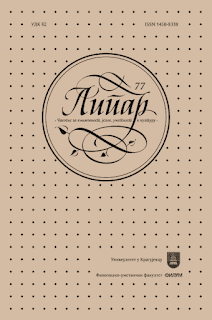АНАЛИЗА ДРАМЕ "МУВЕ" ЖАНА ПОЛА САРТРА ПРЕМА МИТОЛОШКО-РИТУАЛНОЈ КРИТИЦИ
THE ANALYSIS OF SARTRE’S DRAMA "THE FLIES" ACCORDING TO THE MYTH-RITUAL THEORY
Author(s): Teodora S. IlićSubject(s): Language and Literature Studies, Studies of Literature, French Literature, Theory of Literature
Published by: Универзитет у Крагујевцу
Keywords: myth;ritual;myth-ritual theory;The Flies;Sartre;Oresteia;Aeschylus;tragedy
Summary/Abstract: The subject of the paper is the analysis of the play The Flies by Jean Paul Sartre, published in 1943. The paper begins with defining the myth-ritual theory using the anthology The Myth and Ritual Theory by Robert Segal (1998), as the primary theoretical framework of the same. Therefore, by defining the myth- ritual theory, the goal is to present its characteristics in drama, and use them in a comparative analysis with the one above-mentioned play by Jean-Paul Sartre. The focus is put on J. G. Frazer’s theory of the “sacrifical king” as the main premise of tragedies, so we attempt to find this motif in the plays of Aeschylus and Sartre. Our aim was, consequently, to try and notice whether there is a ritual counterpart that corresponds to Sartre’s adaptation of the Electra myth, by also referring to its original source – Aeschylus’ serial Orestes. We start with the analysis of the Orestes trilogy using the myth-ritual theory, and then continue with the same analysis of The Flies. Finally, we come to a conclusion that Sartre does, in fact, adapt the motif of the “sacrificial lamb” of the myth-ritual theory (which is primarily concerned with the character of Orestes), in order to show his theological ideology for which he is famous for – existentialism. On the other hand, Aeschylus gives praise to the ancient gods and the Athenian democracy.
Journal: Липар - часопис за књижевност, језик, уметност и културу
- Issue Year: XXIII/2022
- Issue No: 77
- Page Range: 257-270
- Page Count: 14
- Language: Serbian

